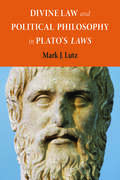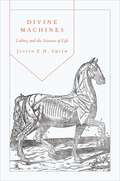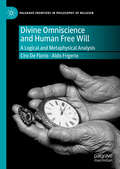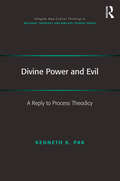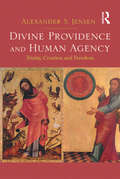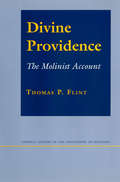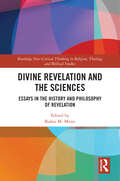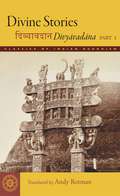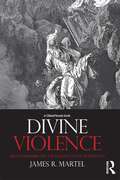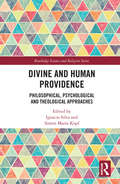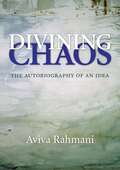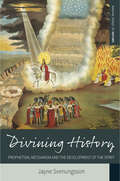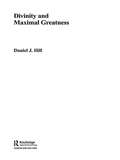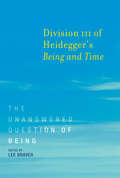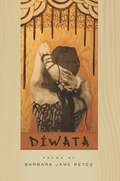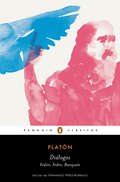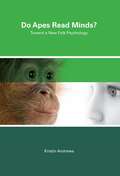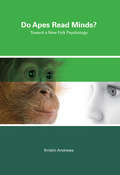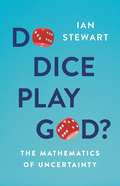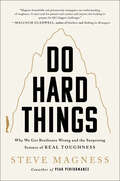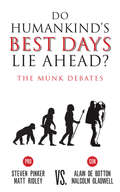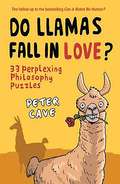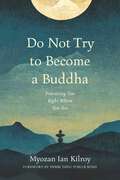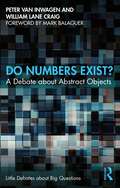- Table View
- List View
Divine Law and Political Philosophy in Plato's "Laws"
by Mark J. LutzAll over the world secular rationalist governments and judicial authorities have been challenged by increasingly forceful claims made on behalf of divine law. For those who believe that reason—not faith—should be the basis of politics and the law, proponents of divine law raise theoretical and practical concerns that must be addressed seriously and respectfully. As Mark J. Lutz makes plain in this illuminating book, they have an important ally in Plato, whose long neglected Laws provides an eye-opening analysis of the relation between political philosophy and religion and a powerful defense of political rationalism. Plato mounts his case, Lutz reveals, through a productive dialogue between his Athenian Stranger and various devout citizens that begins by exploring the common ground between them, but ultimately establishes the authority of rational political philosophy to guide the law. The result will fascinate not only political theorists but also scholars at all levels with an interest in the intersection of religion and politics or in the questions that surround ethics and civic education.
Divine Machines: Leibniz and the Sciences of Life
by Justin Smith-RuiuThough it did not yet exist as a discrete field of scientific inquiry, biology was at the heart of many of the most important debates in seventeenth-century philosophy. Nowhere is this more apparent than in the work of G. W. Leibniz. In Divine Machines, Justin Smith offers the first in-depth examination of Leibniz's deep and complex engagement with the empirical life sciences of his day, in areas as diverse as medicine, physiology, taxonomy, generation theory, and paleontology. He shows how these wide-ranging pursuits were not only central to Leibniz's philosophical interests, but often provided the insights that led to some of his best-known philosophical doctrines. Presenting the clearest picture yet of the scope of Leibniz's theoretical interest in the life sciences, Divine Machines takes seriously the philosopher's own repeated claims that the world must be understood in fundamentally biological terms. Here Smith reveals a thinker who was immersed in the sciences of life, and looked to the living world for answers to vexing metaphysical problems. He casts Leibniz's philosophy in an entirely new light, demonstrating how it radically departed from the prevailing models of mechanical philosophy and had an enduring influence on the history and development of the life sciences. Along the way, Smith provides a fascinating glimpse into early modern debates about the nature and origins of organic life, and into how philosophers such as Leibniz engaged with the scientific dilemmas of their era.
Divine Omniscience and Human Free Will: A Logical and Metaphysical Analysis (Palgrave Frontiers in Philosophy of Religion)
by Ciro De Florio Aldo FrigerioThis book deals with an old conundrum: if God knows what we will choose tomorrow, how can we be free to choose otherwise? If all our choices are already written, is our freedom simply an illusion? This book provides a precise analysis of this dilemma using the tools of modern metaphysics and logic of time. With a focus on three intertwined concepts - God’s nature, the formal structure of time, and the metaphysics time, including the relationship between temporal entities and a timeless God - the chapters analyse various solutions to the problem of foreknowledge and freedom, revealing the advantages and drawbacks of each. Building on this analysis, the authors advance constructive solutions, showing under what conditions an entity can be omniscient in the presence of free agents, and whether an eternal entity can know the tensed futures of the world. The metaphysics of time, its topology and the semantics of future tensed sentences are shown to be invaluable topics in dealing with this issue. Combining investigations into the metaphysics of time with the discipline of temporal logic this monograph brings about important advancements in the philosophical understanding of an ancient and fascinating problem. The answer, if any, is hidden in the folds of time, in the elusive nature of this feature of reality and in the infinite branching of our lives.
Divine Power and Evil: A Reply to Process Theodicy (Routledge New Critical Thinking in Religion, Theology and Biblical Studies)
by Kenneth K. PakEvil perplexes us all and threatens to undermine the meaningfulness of our existence. How can we reconcile the reality of evil with the notion of a God who is perfectly good and powerful? Process theodicy, whose foremost proponent is David Griffin, suggests one answer: because every being possesses its own power of self-determination in order for God to attain the divine aim of higher goodness for the world, God must take the risk of the possibility of evil. Divine Power and Evil responds to Griffin's criticisms against traditional theodicy, assesses the merits of process theodicy, and points out ways in which traditional theism could incorporate a number of Griffin's valuable insights in progressing toward a philosophically and theologically satisfactory theodicy. It provides a new and important contribution to a long-standing debate within philosophy of religion and theology.
Divine Providence and Human Agency: Trinity, Creation and Freedom
by Alexander S. JensenDivine Providence and Human Agency develops an understanding of God and God's relation to creation that perceives God as sovereign over creation while, at the same time, allowing for a meaningful notion of human freedom. This book provides a bridge between contemporary approaches that emphasise human freedom, such as process theology and those influenced by it, and traditional theologies that stress divine omnipotence.This book argues that it is essential for Christian theology to maintain that God is ultimately in charge of history: otherwise there would be no solid grounds for Christian hope. Yet, the modern human self-understanding as free agent within certain limitations must be taken seriously. Jensen approaches this apparent contradiction from within a consistently trinitarian framework. Jensen argues that a Christian understanding of God must be based on the experience of the saving presence of Christ in the Church, leading to an apophatic and consistently trinitarian theology. This serves as the framework for the discussion of divine omnipotence and human freedom. On the basis of the theological foundation established in this book, it is possible to frame the problem in a way that makes it possible to live within this tension. Building on this foundation, Jensen develops an understanding of history as the unfolding of the divine purpose and as an expression of God's very being, which is self-giving love and desire for communion. This book offers an important contribution to the debate of the doctrine of God in the context of an evolutionary universe.
Divine Providence: The Molinist Account (Cornell Studies in the Philosophy of Religion)
by Thomas P. FlintThomas P. Flint develops and defends the idea of divine providence sketched by Luis de Molina, the sixteenth-century Jesuit theologian. The Molinist account of divine providence reconciles two claims long thought to be incompatible: that God is the all-knowing governor of the universe and that individual freedom can prevail only in a universe free of absolute determinism. The Molinist concept of middle knowledge holds that God knows, though he has no control over, truths about how any individual would freely choose to act in any situation, even if the person never encounters that situation. Given such knowledge, God can be truly providential while leaving his creatures genuinely free. Divine Providence is by far the most detailed and extensive presentation of the Molinist view ever written.Middle knowledge is hotly debated in philosophical theology, and the controversy spills over into metaphysics and moral philosophy as well. Flint ably defends the concept against its most influential contemporary critics, and shows its importance to Christian practice. With particular originality and sophistication, he applies Molinism to such aspects of providence as prayer, prophecy, and the notion of papal infallibility, teasing out the full range of implications for traditional Christianity.
Divine Revelation and the Sciences: Essays in the History and Philosophy of Revelation (Routledge New Critical Thinking in Religion, Theology and Biblical Studies)
by Balázs M. MezeiThis book provides an in-depth analysis of the relationship between the sciences and the concept of divine revelation. It includes a historical overview of the notion of revelation, its role in scientific debates over the centuries, and current challenges in light of non-religious and especially non-revelational proposals. The volume emphasizes that discussions of divine revelation cannot be limited to theology alone but must also involve scientific and philosophical approaches. The contributions examine methodological, ethical, and theoretical questions related to the sciences. The main argument is that divine revelation not only played a historical role in shaping our understanding of knowledge but is also present in contemporary scientific endeavours and will continue to be important in the future. Divine revelation is considered to be a critical element of human existence that cannot be avoided in any scientific context. The book will be relevant to scholars of theology and philosophy, particularly those interested in religion and science.
Divine Stories
by Andy RotmanDivine Stories is the inaugural volume in a landmark translation series devoted to making the wealth of classical Indian Buddhism accessible to modern readers. The stories here, among the first texts to be inscribed by Buddhists, highlight the moral economy of karma, illustrating how gestures of faith, especially offerings, can bring the reward of future happiness and ultimate liberation. Originally contained in the Divyavadana, an enormous compendium of Sanskrit Buddhist narratives from the early Common Era, the stories in this collection express the moral and ethical impulses of Indian Buddhist thought and are a testament to the historical and social power of narrative. Long believed by followers to be the actual words of the Buddha himself, these divine stories are without a doubt some of the most influential stories in the history of Buddhism.
Divine Violence: Walter Benjamin and the Eschatology of Sovereignty
by James R. MartelDivine Violence looks at the question of political theology and its connection to sovereignty. It argues that the practice of sovereignty reflects a Christian eschatology, one that proves very hard to overcome even by left thinkers, such as Arendt and Derrida, who are very critical of it. These authors fall into a trap described by Carl Schmitt whereby one is given a (false) choice between anarchy and sovereignty, both of which are bound within—and return us to—the same eschatological envelope. In Divine Violence, the author argues that Benjamin supplies the correct political theology to help these thinkers. He shows how to avoid trying to get rid of sovereignty (the "anarchist move" that Schmitt tells us forces us to "decide against the decision") and instead to seek to de-center and dislocate sovereignty so that it’s mythological function is disturbed. He does this with the aid of divine violence, a messianic force that comes into the world to undo its own mythology, leaving nothing in its wake. Such a move clears the myths of sovereignty away, turning us to our own responsibility in the process. In that way, the author argues,Benjamin succeeds in producing an anarchism that is not bound by Schmitt’s trap but which is sustained even while we remain dazzled by the myths of sovereignty that structure our world. Divine Violence will be of interest to students of political theory, to those with an interest in political theology, philosophy and deconstruction, and to those who are interested in thinking about some of the dilemmas that the ‘left’ finds itself in today.
Divine and Human Providence: Philosophical, Psychological and Theological Approaches (Routledge Science and Religion Series)
by Ignacio Silva Simon KopfThis volume offers an original perspective on divine providence by examining philosophical, psychological, and theological perspectives on human providence as exhibited in virtuous human behaviours. Divine providence is one of the most pressing issues in analytic theology and philosophy of religion today, especially in view of scientific evidence for a natural world full of indeterminacies and contingencies. Therefore, we need new ways to understand and explain the relations of divine providence and creaturely action. The volume is structured dynamically, going from chapters on human providence to those on divine providence, and back. Drawing on insights from virtue ethics, psychology and cognitive science, the philosophy of providence in the face of contingent events, and the theology of grace, each chapter contributes to an original overall perspective: that human providential action is a resource suited specifically to personal action and hence related to the purported providential action of a personal God. By putting forward a fresh take on divine providence, this book enters new territory on an age-old issue. It will therefore be of great interest to scholars of theology and philosophy.
Divining Chaos: The Autobiography of an Idea
by Aviva RahmaniA spirited memoir by artist Aviva Rahmani, offering a relatable narrative to discuss trigger point theory and the importance of eco-art activism.Divining Chaos is an intimate personal memoir of unparalleled transparency into the moments in Rahmani's life that shaped her as an artist and activist. Detailing the history that led her to two seminal projects—Ghost Nets, restoring a coastal town dump to flourishing wetlands, and The Blued Trees Symphony, which applied her premises to challenge natural gas pipelines with a novel legal theory about land use—Rahmani shares the decisions that shaped her life’s work and thinking. Her discussions about trigger point theory argue for how to predict, confront, and determine outcomes to the ecological challenges we face today.
Divining History: Prophetism, Messianism and the Development of the Spirit (Making Sense of History #26)
by Jayne SvenungssonFor millennia, messianic visions of redemption have inspired men and women to turn against unjust and oppressive orders. Yet these very same traditions are regularly decried as antecedents to the violent and authoritarian ideologies of modernity. Informed in equal parts by theology and historical theory, this book offers a provocative exploration of this double-edged legacy. Author Jayne Svenungsson rigorously pursues a middle path between utopian arrogance and an enervated postmodernism, assessing the impact of Jewish and Christian theologies of history on subsequent thinkers, and in the process identifying a web of spiritual and intellectual motifs extending from ancient Jewish prophets to contemporary radicals such as Giorgio Agamben and Slavoj Zizek.
Divinity and Maximal Greatness (Routledge Studies in the Philosophy of Religion)
by Daniel HillThis book examines the divine nature in terms of maximal greatness. It investigates each attribute associated with maximal greatness - omnipotence, omniscience, perfect goodness, eternity, and beauty, arguing that maximal greatness is necessary and sufficient for divinity.
Division III of Heidegger's Being and Time: The Unanswered Question of Being
by Lee BraverLeading philosophers and scholars speculate on what Heidegger's unfinished masterpiece might have said, why Heidegger didn't publish it, and what being actually means.Heidegger's Being and Time is one of the most influential and important books in the history of philosophy, but it was left unfinished. The parts we have of it, Divisions I and II of Part One, were meant to be merely preparatory for the unwritten Division III, which was to have formed the point of the entire book when it turned to the topic of being itself. In this book, leading Heidegger scholars and philosophers influenced by Heidegger take up the unanswered questions in Heidegger's masterpiece, speculating on what Division III would have said, and why Heidegger never published it. The contributors' task—to produce a secondary literature on a nonexistent primary work—seems one out of fiction by Borges or Umberto Eco. Why did Heidegger never complete Being and Time? Did he become dissatisfied with it? Did he judge it too subjectivistic, not historical enough, too individualistic, too existential? Was abandoning it part of Heidegger's “Kehre”, his supposed turning from his early work to his later work? Might Division III have offered a bridge between the two phases, if a division exists between them? And what does being mean, after all? The contributors, in search of lost Being and Time, consider these and other topics, shedding new light on Heidegger's thought.ContributorsAlain Badiou, Lee Braver, Daniel Dahlstrom, Charles Guignon, Graham Harman, Karsten Harries, Ted Kisiel, Denis McManus, Eric S. Nelson, Richard Polt, François Raffoul, Thomas Sheehan, Iain Thomson, Kate Withy, Julian Young
Diwata
by Barbara Jane ReyesTagalog is a language spoken by twenty-two million people in the Philippines. Diwata is a Tagalog term meaning "muse." Diwata is also a term for a mythical being who resides in nature, and who human communities must acknowledge, respect, and appease in order to live harmoniously in this world.In her book Diwata, Barbara Jane Reyes frames her poems between the Book of Genesis creation story and the Tagalog creation myth, placing her work somewhere culturally between both traditions. Also setting the tone for her poems is the death and large shadow cast by her grandfather, a World War II veteran and Bataan Death March survivor, who has passed onto her the responsibility of remembering. Reyes' voice is grounded in her community's traditions and histories, despite war and geographical dislocation.From "Estuary 2":She was born with fins and fishtail,A quick blade slicing water.She was her father's mermaid child,A river demon, elders said.She mimicked her cetaceous brothers,Abalone diving bluest depths.She polished smooth her brothers' masks,Inlaid nacre half moon eyes.She lit oak pyres and bade the windA whispered requiem.Barbara Jane Reyes is author of two previous poetry collections including Poeta en San Francisco, which was awarded the 2005 James Laughlin Award from the Academy of American Poets. She was born in Manila and raised in the San Francisco Bay Area. She works as adjunct professor in Philippine studies at the University of San Francisco.From National Book Critics Circle:"Diwata as a mythological invocation takes teh reader back to pre-colonial Philippines when the belief in these god and goddesses shaped the everyday lives on the Southeast Asian archipelago. They have now become your muses as you reach toward this cultural legacy to shape a distinct postmodern poetics in which yo u don't simply erase colonial history- you build with that narrative as well."
Diwata (American Poets Continuum #123)
by Barbara Jane ReyesTagalog is a language spoken by twenty-two million people in the Philippines. Diwata is a Tagalog term meaning "muse." Diwata is also a term for a mythical being who resides in nature, and who human communities must acknowledge, respect, and appease in order to live harmoniously in this world.In her book Diwata, Barbara Jane Reyes frames her poems between the Book of Genesis creation story and the Tagalog creation myth, placing her work somewhere culturally between both traditions. Also setting the tone for her poems is the death and large shadow cast by her grandfather, a World War II veteran and Bataan Death March survivor, who has passed onto her the responsibility of remembering. Reyes' voice is grounded in her community's traditions and histories, despite war and geographical dislocation.From "Estuary 2":She was born with fins and fishtail,A quick blade slicing water.She was her father's mermaid child,A river demon, elders said.She mimicked her cetaceous brothers,Abalone diving bluest depths.She polished smooth her brothers' masks,Inlaid nacre half moon eyes.She lit oak pyres and bade the windA whispered requiem.Barbara Jane Reyes is author of two previous poetry collections including Poeta en San Francisco, which was awarded the 2005 James Laughlin Award from the Academy of American Poets. She was born in Manila and raised in the San Francisco Bay Area. She works as adjunct professor in Philippine studies at the University of San Francisco.From National Book Critics Circle:"Diwata as a mythological invocation takes teh reader back to pre-colonial Philippines when the belief in these god and goddesses shaped the everyday lives on the Southeast Asian archipelago. They have now become your muses as you reach toward this cultural legacy to shape a distinct postmodern poetics in which yo u don’t simply erase colonial history- you build with that narrative as well."
Diálogos: Fedón, Fedro, Banquete
by PlatónUna de las obras cumbre de la filosofía y la cultura occidental. «Se apoderó de mí el temor de quedarme completamente ciego de alma si miraba a las cosas con los ojos.» El presente volumen reúne tres diálogos fundamentales de Platón; tres de sus obras más leídas y comentadas, junto a La república . En Fedón, que tiene lugar durante las últimas horas de vida de Sócrates, Platón expone sus ideas en relación a la madurez y reflexiona sobre la inmortalidad del alma. Fedro, reconocido como uno de los diálogos platónicos más bellos, gira en torno al tema del amor. Este también se convierte en objeto de reflexión en Banquete, considerada una de las obras cumbres escritas sobre esta cuestión y en la que el diálogo se desarrolla a lo largo de una reunión de amigos e intelectuales. Este magnífico volumen presenta la traducción clásica de Luis Gil y María Arujo. Asimismo la edición está a cargo de Fernando Pérez-Borbujo, filósofo y profesor titular en la facultad de humanidades de la Universidad Pompeu Fabra de Barcelona.
Do Apes Read Minds?
by Kristin AndrewsBy adulthood, most of us have become experts in human behavior, able to make sense of the myriad behaviors we find in environments ranging from the family home to the local mall and beyond. In philosophy of mind, our understanding of others has been largely explained in terms of knowing others' beliefs and desires; describing others' behavior in these terms is the core of what is known as folk psychology. In Do Apes Read Minds? Kristin Andrews challenges this view of folk psychology, arguing that we don't consider others' beliefs and desires when predicting most quotidian behavior, and that our explanations in these terms are often inaccurate or unhelpful. Rather than mindreading, or understanding others as receptacles for propositional attitudes, Andrews claims that folk psychologists see others first as whole persons with traits, emotions, and social relations. Drawing on research in developmental psychology, social psychology, and animal cognition, Andrews argues for a pluralistic folk psychology that employs different kinds of practices (including prediction, explanation, and justification) and different kinds of cognitive tools (including personality trait attribution, stereotype activation, inductive reasoning about past behavior, and generalization from self) that are involved in our folk psychological practices. According to this understanding of folk psychology -- which does not require the sophisticated cognitive machinery of second-order metacognition associated with having a theory of mind -- animals (including the other great apes) may be folk psychologists, too.
Do Apes Read Minds?: Toward a New Folk Psychology
by Kristin AndrewsAn argument that as folk psychologists humans (and perhaps other animals) don't so much read minds as see one another as persons with traits, emotions, and social relations.By adulthood, most of us have become experts in human behavior, able to make sense of the myriad behaviors we find in environments ranging from the family home to the local mall and beyond. In philosophy of mind, our understanding of others has been largely explained in terms of knowing others' beliefs and desires; describing others' behavior in these terms is the core of what is known as folk psychology. In Do Apes Read Minds? Kristin Andrews challenges this view of folk psychology, arguing that we don't consider others' beliefs and desires when predicting most quotidian behavior, and that our explanations in these terms are often inaccurate or unhelpful. Rather than mindreading, or understanding others as receptacles for propositional attitudes, Andrews claims that folk psychologists see others first as whole persons with traits, emotions, and social relations.Drawing on research in developmental psychology, social psychology, and animal cognition, Andrews argues for a pluralistic folk psychology that employs different kinds of practices (including prediction, explanation, and justification) and different kinds of cognitive tools (including personality trait attribution, stereotype activation, inductive reasoning about past behavior, and generalization from self) that are involved in our folk psychological practices. According to this understanding of folk psychology—which does not require the sophisticated cognitive machinery of second-order metacognition associated with having a theory of mind—animals (including the other great apes) may be folk psychologists, too.
Do Dice Play God?: The Mathematics of Uncertainty
by Ian StewartA celebrated mathematician explores how math helps us make sense of the unpredictableWe would like to believe we can know things for certain. We want to be able to figure out who will win an election, if the stock market will crash, or if a suspect definitely committed a crime. But the odds are not in our favor. Life is full of uncertainty --- indeed, scientific advances indicate that the universe might be fundamentally inexact --- and humans are terrible at guessing. When asked to predict the outcome of a chance event, we are almost always wrong. Thankfully, there is hope. As award-winning mathematician Ian Stewart reveals, over the course of history, mathematics has given us some of the tools we need to better manage the uncertainty that pervades our lives. From forecasting, to medical research, to figuring out how to win Let's Make a Deal, Do Dice Play God? is a surprising and satisfying tour of what we can know, and what we never will.
Do Hard Things: Why We Get Resilience Wrong and the Surprising Science of Real Toughness
by Steve MagnessNational Bestseller"In Do Hard Things, Steve Magness beautifully and persuasively reimagines our understanding of toughness. This is a must-read for parents and coaches and anyone else looking to prepare for life's biggest challenges." -- Malcolm Gladwell, author of Outliers and Talking to Strangers and host of the Revisionist History podcastFrom beloved performance expert, executive coach, and coauthor of Peak Performance Steve Magness comes a radical rethinking of how we perceive toughness and what it means to achieve our high ambitions in the face of hard things.Toughness has long been held as the key to overcoming a challenge and achieving greatness, whether it is on the sports field, at a boardroom, or at the dining room table. Yet, the prevailing model has promoted a mentality based on fear, false bravado, and hiding any sign of weakness. In other words, the old model of toughness has failed us.Steve Magness, a performance scientist who coaches Olympic athletes, rebuilds our broken model of resilience with one grounded in the latest science and psychology. In Do Hard Things, Magness teaches us how we can work with our body – how experiencing discomfort, leaning in, paying attention, and creating space to take thoughtful action can be the true indications of cultivating inner strength. He offers four core pillars to cultivate such resilience: Pillar 1- Ditch the Façade, Embrace RealityPillar 2- Listen to Your BodyPillar 3- Respond, Instead of React Pillar 4- Transcend Discomfort Smart and wise all at once, Magness flips the script on what it means to be resilient. Drawing from mindfulness, military case studies, sports psychology, neuroscience, psychology, and philosophy, he provides a roadmap for navigating life’s challenges and achieving high performance that makes us happier, more successful, and, ultimately, better people.
Do Humankind’s Best Days Lie Ahead?: The Munk Debates (The Munk Debates #2015)
by Steven Pinker Malcolm Gladwell Matt Ridley Alain de BottonProgress. It is one of the animating concepts of the modern era. From the Enlightenment onwards, the West has had an enduring belief that through the evolution of institutions, innovations, and ideas, the human condition is improving. This process is supposedly accelerating as new technologies, individual freedoms, and the spread of global norms empower individuals and societies around the world. But is progress inevitable? Its critics argue that human civilization has become different, not better, over the last two and a half centuries. What is seen as a breakthrough or innovation in one period becomes a setback or limitation in another. In short, progress is an ideology not a fact; a way of thinking about the world as opposed to a description of reality.In the seventeenth semi-annual Munk Debates, which was held in Toronto on November 6, 2015, pioneering cognitive scientist Steven Pinker and bestselling author Matt Ridley squared off against noted philosopher Alain de Botton and bestselling author Malcolm Gladwell to debate whether humankind’s best days lie ahead.
Do Llamas Fall in Love?: 33 Perplexing Philosophy Puzzles
by Peter CaveIn this stunning sequel to Peter Cave's bestselling philosophy books, Can a Robot be Human? and What's Wrong with Eating People, Peter Cave once again engages the reader in a romp through the best bits of philosophical thought. With the aid of tall stories, jokes, common sense and bizarre insights, Cave tackles some of life's most important questions and introduces the puzzles that will keep you pondering throughout the night. Illustrated with quirky cartoons throughout, Do Llamas Fall in Love leaves no stone unturned, covering a smorgasbord of topics including logic, ethics, art and politics. It will provide a perfect gift for anyone who puzzles about the world! Peter Cave is a lecturer in philosophy at The Open University and City University, London, UK. He frequently contributes to philosophy magazines and journals, lectures around the world, and has scripted and presented philosophy programmes for the BBC. With worldwide sales of over 50,000 books, he is one of the leading British philosophers.
Do Not Try to Become a Buddha
by Ian KilroyA Zen Buddhist priest paints a picture of Zen in Ireland in this collection of short essays.In this personal and enlightening collection of short essays, Irish Soto Zen priest Myozan Ian Kilroy describes how he came to practice Zen, introduces the basics of Zen philosophy, and recalls the challenges of establishing a Zen Buddhist community in Catholic-dominated Ireland. Along the way, he explores the rituals and practices that Zen brings to everyday life, from holidays to weddings to birth ceremonies to funerals. A former journalist, Rev. Myozan&’s clear yet entertaining storytelling style paints a clear picture of how Zen has adapted to the culture and traditions of Ireland.
Do Numbers Exist?: A Debate about Abstract Objects (Little Debates about Big Questions)
by Peter van Inwagen William Lane CraigIn Do Numbers Exist? Peter van Inwagen and William Lane Craig take opposite sides on whether there are abstract objects, such as numbers and properties. Craig argues that there are no abstract objects, whereas Van Inwagen argues that there are. Their exchange explores various arguments about the existence and nature of abstract objects. They focus especially on whether our ordinary and scientific thought and talk commit us to abstract objects, surveying the options available to us and the objections each faces. The debate covers central problems and methods in metaphysics, and also delves into theological questions raised by abstract objects.Key Features: Showcases the presentation and defense of two points of view on the existence of abstract objects, from two of the world’s leading philosophers Presents definitions in an easily accessible form Provides frequent summaries of previously covered material Includes a glossary of all specialized vocabulary
